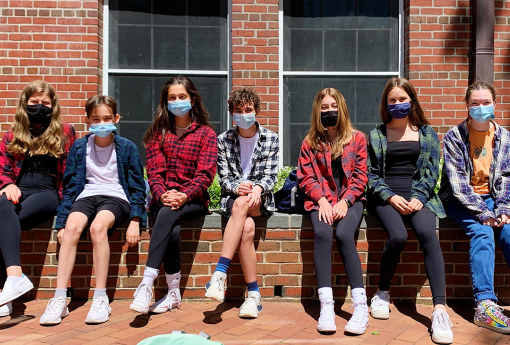
Growing Minds: Marshmallows and Data Sets
September 10, 2019
What do marshmallows and data sets have in common? Not a lot unless you are lucky to be a student in Wheeler’s N-8 Divisions.
Much to their delight, 8th graders get a marshmallow in their first Cityside class as part of a design challenge. In this challenge, students have to elevate a marshmallow off their work table with 25 strands of spaghetti held together with no more than about two feet of masking tape. They quickly learn about the strength of triangles, the physics of a wide base, and the science and art of effective collaboration. Students also learn about humility as they watch a video showing kindergartners outperforming MBA degree holders (and them) in the so-called marshmallow challenge. While those with MBAs know about data sets, so do our Lower Schoolers. Lower Schoolers learn to see the world mathematically even in a bag of Skittles. Third graders analyze, and are somewhat shocked, that a bag of Skittles has an uneven distribution of flavors. They do data analysis on everything from their backpacks and their DIB Lab-designed trebuchets. In these analyses, Lower Schoolers begin to learn that math “possesses not only truth, but supreme beauty” to quote Betrand Russell. They also learn that math can be a tasty and joyful experience. Marshmallows and data sets are just two examples of the curriculum progression made in unique ways in our N-8 Divisions.
Last year, in preparation for my new role and to welcome Felicia Vinces as Lower School Director and Vanessa O’Driscoll as Middle School Director, I made a commitment to visit all the Lower School classrooms. In those Lower School classrooms I was privileged to visit, I witnessed remarkable teaching and learning in every grade and across the disciplines. While the teaching style and methods were different in concrete ways than those in the Middle School, the commonalities were striking.
As I reflected on my Lower School observations and nearly thirty years of experience in the Middle School as a teacher and leader, I came to see the ways that our N-5 and 6-8 grade programs share one N-8 identity. This identity is based on:
- the potential of learning without limits;
- the blurring of the lines between tradition and innovation in our practice;
- the emphasis on challenging and meaningful work; and,
- the critical importance of teacher/student relationships, relationships of shared curiosity, respect, and joy.
Manifesting the N-8 Identity
How does this N-8 idea manifest itself? How are these things palpable? And, why are they important in your child’s education and preparation for our Upper School?
Learning without Limits on a Permeable Campus: At Wheeler, N-8 students enjoy a permeable campus. Students learn on the 216 Hope St. block, at the 120 acres at the Wheeler Farm (home to Forest Fridays and the Farm Program,) and in the Waterfire Arts Center home of the Cityside Program. Learning environments vary from conventional classrooms to stands of conifers, to public parks and community agencies, and finally to studios and athletic space. In this way, Wheeler’s N-8 is more of an educational set of principles and approaches than an isolated, physical place surrounded by literal and figurative walls. Whether nursery students dig in the dirt for earthworms learning the fundamentals of soil biology (without knowing it) or are 8th graders participating in a longitudinal study of water quality in the Woonasquatucket River, the students’ educational experience is hands-on, experiential, and vivid. Truly exciting to me is the opportunity a permeable campus affords: learning limited only by the curiosity of the student rather than by walls and limited resources. Many schools, including Wheeler, tout learning without bounds via internet-connected technology. But Wheeler’s N-8 Divisions offers the Wheeler Farm, Providence, and beyond as learning environments.
Expert, Flexible and Individualized Teaching: Wheeler N-8 students are surrounded by expert teachers who can move flexibly between more “traditional” educational practices and programs in all disciplines and those required for a 21st-century education that befits the Wheeler name. Often, the new and old are expertly mixed. In a lesson ostensibly designed to promote social-emotional learning through practicing empathy, nursery students expand and develop their vocabulary and reading skills. And wherever they teach, Wheeler N-8 teachers are predisposed to reach all students. They reach the more socially activated students through collaborative projects and draw out the talents of a quieter student by finding what lights them up in the curriculum. They use their colleagues to work out new ideas and consider new approaches to reach each child. Teachers are able to reach a broad range of students because they work on a permeable campus and in collaboration with talented professionals. For example, teachers bring out the best in a student named Sarah who struggles to sit still during morning meeting and focus on anything but her friends. They use the Farm as a classroom creating learning opportunities so she can collaborate with others to figure out how fulcrum points work on a plank balanced on a rock. This elementary lesson on basic physics would not be as vivid and memorable were it not for regular use of the Farm. And for Sarah, were we one campus with conventional classrooms, learning would be a struggle.
Meaningful, challenging work: Wheeler N-8 teachers have a love/hate with the concept of rigor. They tend to be disinclined toward the 20th-century version of rigor where students, particularly older N-8 students, endure a cycle of read, memorize, test, read, memorize, test only to forget what they were tested on and to be understood as a set of numbers. The 21st- century version emphasizes a multi-layered approach where students solve open-ended problems, use multiple resources (internet-based and not) for research, work collaboratively, and produce work that demands effective communication, logical and creative thinking, careful consideration of audience, and high-level executive functioning. As a 7th grader, Sarah no longer has to sit fidgeting through an endless cycle of quizzes and tests but has to figure out with her partners how best to research and write about Brown University’s reliance on slave labor to construct its campus. Her teacher takes Sarah and her partners to the field to research and conduct interviews. After turning in their essay as evidence of learning, their teacher encourages them to share their learning with a greater audience. They decide to create a podcast on what they’ve learned and face tech and writing challenges. They know a podcast can’t be completely scripted but shouldn’t be completely improvised. Their teacher says that they must use intro and outro music that they compose and play. Sarah struggles but her struggles are productive and fun (though she hates to admit it to her parents). Most importantly, she will never forget what she learned about the role of enslaved people at Brown.
Relationships: While innovative and highly skills-based, the N-8 culture’s reason for success is the relationship between teacher and student. The reason for the success of Wheeler’s N-8 education is not the latest technology or pedagogy (although they are important); it’s in the close relationships between adults and children where teachers respect their students in the moment, but also know how to adapt, pivot, and collaborate to help their charges grow. Additionally, when N-8 teachers are at their best, they see their students as whole human beings with interests, vulnerabilities, and untapped abilities. In their appreciations, Wheeler seniors often point to their close and formative relationships with Lower and Middle School teachers as the reason for their success in the Upper School.
So as the Head of Strategic Innovation and N-8 Divisions, I am excited to make the once implied and unstated identity of the Lower and Middle Schools vivid to all and to collaborate with my colleagues to enhance an unparalleled N-8 educational experience.
By Young Un
Head of Strategic Innovation and N-8 Divisions
Growing Minds is the periodic blog about Grades Nursery – 8 at Wheeler.

